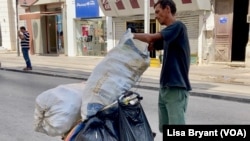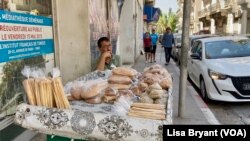Mohammed, scavenging for plastic litter along the capital's broken streets, works in Tunisia's once-booming tourism industry, earning salaries, room rates and money to entertain Europeans. We are talking about the brighter days when we earned our meals.
"In the past, Tunisia was the symbol of the Arab world," says Mohammed, 46, with tight wrinkles.
"Of course it was a police state under Jin El Abidin Ben Ali," he added of the country's former dictator, who was ousted in a revolution 11 years ago. Now we are smitten.
As current President Qais Said solidifies his grip on the small North African nation under a newly passed constitution, he promises jobs, bread and stability to citizens like Mohammed. challenged to fulfill. For 20 cents you can recycle your trash in a large burlap bag.
"I did not vote," said Mohammed. His 70% of eligible Tunisians who refused to participate in his July 25 referendum on Said's charter were either against or indifferent. ``I don't trust politicians.''
This vote is just one of the reasons Said seized enormous power to dismiss the government and eventually dissolve parliament. It was done a year later. This was what the opposition called a coup.

Today, the future of Tunisia, and that of Said, depends on whether the president can secure and sell vital International Monetary Fund loans, and whether the country's major Tight austerity requirements to save the country's moribund economy, on the count of powerful players such as trade unions and a respected military.
Also shaping the country's trajectory will be whether Mr. Said will be able to maintain a waning but still sizable support, and if Tunisians believe another government has failed. "We are in a real state of uncertainty," said Hamadi Redisi, professor of political science at the University of Tunis. If he improves the economic and social conditions of his people, he will probably be re-elected, but if he sticks only to the constitution and elections, the country will probably be in crisis."
35} The Dark Decade.What happens next holds important lessons in a region where all other Arab Spring experiments have failed, and disillusionment with multiparty politics appears to be growing.
A recent Arab Barometer poll found that public confidence in democracy as an engine of economic growth is declining, including in Tunisia. Like garbage collector Mohammed, many here miss their perceived heyday under Ben Ali's magnate rule. The country's quarrels and deadlocked political parties have only helped cement their views.
But the expulsion of Ben He Ali in 2011 triggered a broader Arab Spring uprising, fueled by the same bread and butter concerns as today. Only now things are getting worse.
Tunisia's democracy, however flawed and fragile, "was really, really important," says Monica Marks, assistant professor of Middle East politics at New York University Abu Dhabi. "Tunisian democracy has been a powerful counterpoint not only to the region's tyranny, but also to violent extremists."

Ex-soldier Murad Sassi instead sees the years since the Tunisian revolution as "his decade of darkness".
"I don't even have money to buy cooking oil or anything like that," he says. ``We don't think he's going to live another 10 years at this rate.''
``'Fatigue' is the word you hear most often,'' says Marks. "The summer heat seems to have withered Tunisians, and their energy to defend the only democracy in the Arab and Muslim world has also waned."
Man
Of course, Said and his supporters make different claims. The president is committed to defending freedom of revolution and has said that his constitution will better meet the demands of the streets by creating the so-called regional councils as the second house of parliament. increase.
Many ordinary Tunisians are proud of their national leader, an unremarkable constitutional scholar from a modest region who came to power in 2019 in an unlikely narrow election campaign. I am thinking.
"Qais Said has clean hands," says taxi driver Mohammed Bokadi. ``He is a man of learning.''
But Mr. Said's rule has been lean, with little desire to prioritize the economy, and he has been unable to surround himself with effective political allies. No, analysts say. His prime minister, Naira Boden, is a former geologist.
Publicly, Western leaders have reacted mutedly to Said's move. But when Washington expressed concern about "eroding democratic norms" last month, Tunisian Foreign Minister Osman Gelandi hit back, calling the statement "interference in domestic affairs."
While some civil society groups and political opponents have questioned the results of the referendum, the constitution has gone from cracking down on political commentators and journalists to dismissing dozens of judges, saying Until his dismissal, he says, the years of erosion of rights are simply cemented. A few weeks before the referendum, the board of the Independent Electoral Commission was replaced.
Tunisians have partially responded to increased self-censorship, analyst Marks says. This is characteristic of the pre-revolutionary era.
"When Kais became president last year, many naturally stopped talking about politics on the phone because they believed their phones were tapped again," she says.
"No one can say no to Qais Said," says Rached Ghannouchi, leader of the once-powerful Islamist-inspired Ennahdha party in Tunisia. He is under investigation for alleged corruption, which he dismisses as politically motivated.
"He rules the Judiciary, the National Assembly, the Executive," added Ghannooch, adding, "He rules like a Pharaoh."
Looking Forward in the Rocky Era
Tunisian leaders face considerable challenges. Powerful his UGTT deal threatens another strike next week over improved wages and benefits, and could pave the way for rising social unrest.
It is unclear how much Saeed can trust the country's security forces, including the popular military that sided with the people in the 2011 uprising.
"Looks like he still has an army," says analyst Marks. But "the military may recalculate" if the country leans into his decade-old mass protests.
Marks, for example, is not betting on the president.
"I think Kais is destined to be the most unlucky creature, an unpopular populist," she says. "I think his life is numbered – I don't know how much time is left." and I am convinced that the final decision rests with the Tunisians.
"It's up to us to change the situation," she says. "We must make our country a better place."


